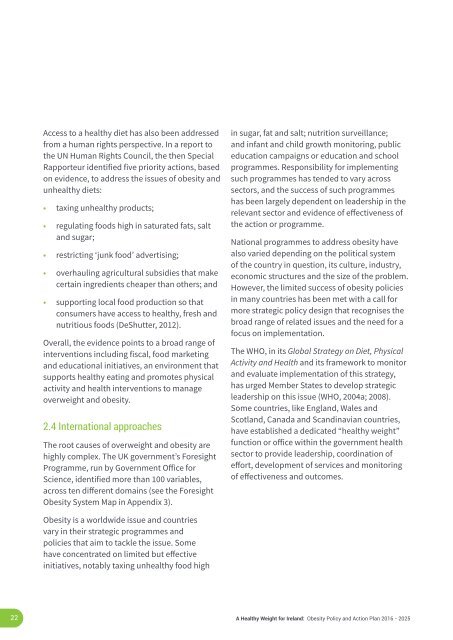for Ireland
A-Healthy-Weight-for-Ireland-Obesity-Policy-and-Action-Plan-2016-2025
A-Healthy-Weight-for-Ireland-Obesity-Policy-and-Action-Plan-2016-2025
Create successful ePaper yourself
Turn your PDF publications into a flip-book with our unique Google optimized e-Paper software.
Access to a healthy diet has also been addressed<br />
from a human rights perspective. In a report to<br />
the UN Human Rights Council, the then Special<br />
Rapporteur identified five priority actions, based<br />
on evidence, to address the issues of obesity and<br />
unhealthy diets:<br />
• taxing unhealthy products;<br />
• regulating foods high in saturated fats, salt<br />
and sugar;<br />
• restricting ‘junk food’ advertising;<br />
• overhauling agricultural subsidies that make<br />
certain ingredients cheaper than others; and<br />
• supporting local food production so that<br />
consumers have access to healthy, fresh and<br />
nutritious foods (DeShutter, 2012).<br />
Overall, the evidence points to a broad range of<br />
interventions including fiscal, food marketing<br />
and educational initiatives, an environment that<br />
supports healthy eating and promotes physical<br />
activity and health interventions to manage<br />
overweight and obesity.<br />
2.4 International approaches<br />
The root causes of overweight and obesity are<br />
highly complex. The UK government’s Foresight<br />
Programme, run by Government Office <strong>for</strong><br />
Science, identified more than 100 variables,<br />
across ten different domains (see the Foresight<br />
Obesity System Map in Appendix 3).<br />
in sugar, fat and salt; nutrition surveillance;<br />
and infant and child growth monitoring, public<br />
education campaigns or education and school<br />
programmes. Responsibility <strong>for</strong> implementing<br />
such programmes has tended to vary across<br />
sectors, and the success of such programmes<br />
has been largely dependent on leadership in the<br />
relevant sector and evidence of effectiveness of<br />
the action or programme.<br />
National programmes to address obesity have<br />
also varied depending on the political system<br />
of the country in question, its culture, industry,<br />
economic structures and the size of the problem.<br />
However, the limited success of obesity policies<br />
in many countries has been met with a call <strong>for</strong><br />
more strategic policy design that recognises the<br />
broad range of related issues and the need <strong>for</strong> a<br />
focus on implementation.<br />
The WHO, in its Global Strategy on Diet, Physical<br />
Activity and Health and its framework to monitor<br />
and evaluate implementation of this strategy,<br />
has urged Member States to develop strategic<br />
leadership on this issue (WHO, 2004a; 2008).<br />
Some countries, like England, Wales and<br />
Scotland, Canada and Scandinavian countries,<br />
have established a dedicated “healthy weight”<br />
function or office within the government health<br />
sector to provide leadership, coordination of<br />
ef<strong>for</strong>t, development of services and monitoring<br />
of effectiveness and outcomes.<br />
Obesity is a worldwide issue and countries<br />
vary in their strategic programmes and<br />
policies that aim to tackle the issue. Some<br />
have concentrated on limited but effective<br />
initiatives, notably taxing unhealthy food high<br />
22<br />
A Healthy Weight <strong>for</strong> <strong>Ireland</strong>: Obesity Policy and Action Plan 2016 - 2025


